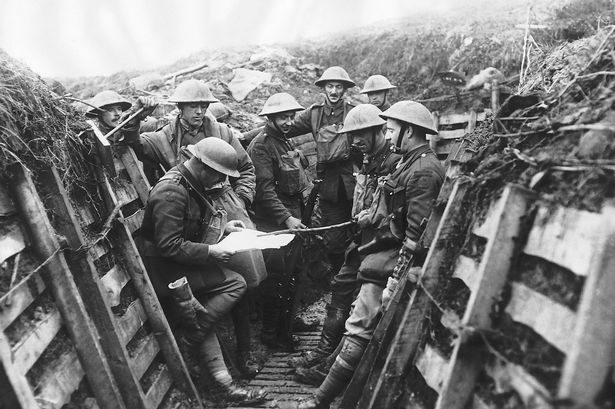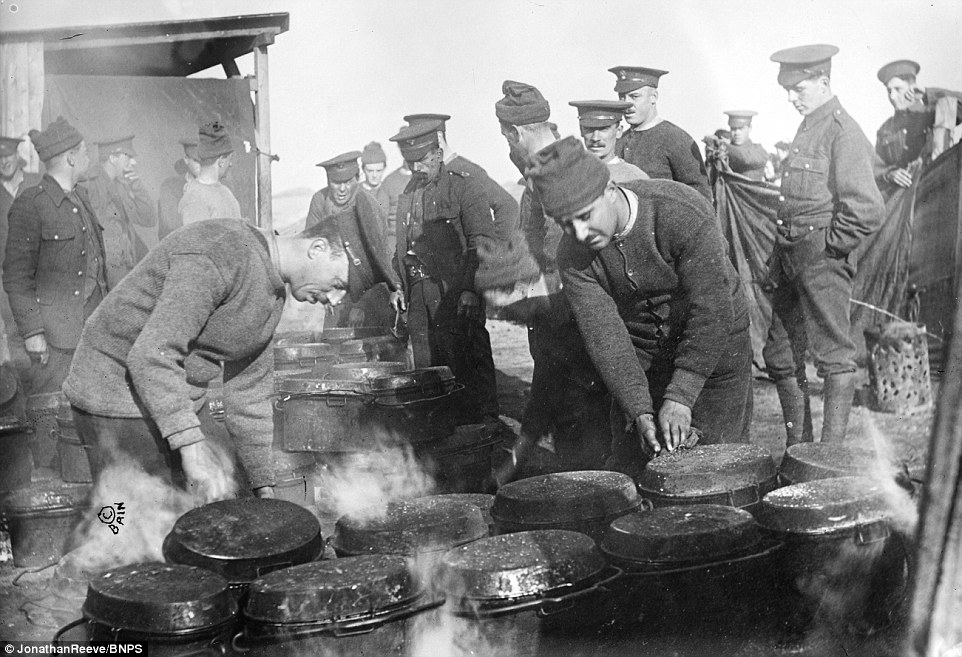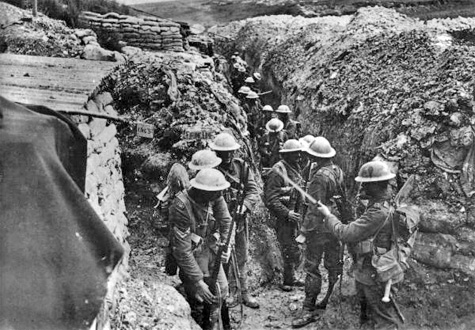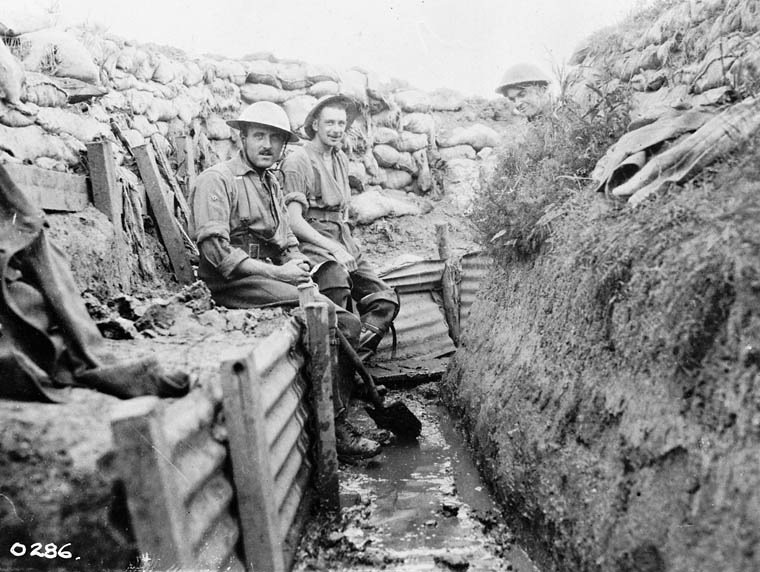Life in the Trenches
Daily Routine in the Trenches

Day-to-day life in the trenches was a mixture of routine, hard work and boredom, with sudden moments of terror from enemy snipers, artillery bombardments, or attacks. Trench life was often very tedious and full of hard physical labour. The main enemies were the weather and boredom. However, even a momentary lapse in concentration - leaving yourself exposed to sniper fire, for example - could prove deadly.
A typical daily routine was:
"Stand To" at Dawn - An hour before dawn the officers and sergeants woke up anyone who was sleeping. All soldiers then fixed bayonets, and manned their stations. The infantrymen mounted the fire step and prepared to repulse a dawn raid by the enemy. Even though both sides did these preparations daily, many attacks were actually made at or just before dawn. Often 'stand to's" ended with both sides firing their machine guns, mortars and artillery. This was known as the "morning hate".
Breakfast and Weapons Cleaning - After the "stand to" chosen soldiers would wind their way through the maze of trenches to the Company kitchens. They would fill large metal containers with tea, coffee, oatmeal, or soup and carry it back to their mates. By the time they returned, however, the food was often cold and everything tasted the same. While some units ate others would clean their weapons and equipment. Meals and cleaning were done in shifts to make sure the trench was always defended.

Inspection - When breakfast was over the officers and sergeants would inspect the mens' equipment. Weapons would be checked to
ensure that they were clean and serviceable. Often this inspection would include a 'foot inspection' looking for signs of 'trench foot'.
Some men would deliberately allow their feet to become swollen and crippled as a way of being sent home.

Daily Chores - During the day the men would work in shifts. As one section stood alternated sentry duty or slept, another would fill sandbags, repair the "duckboards" walkways, pump out water from the trenches, dig latrines, or other tasks to maintain their section of the trench. All work had to be done below the level of the trench parapet to avoid sniper fire. During quiet times men would sleep, write letters, play cards, or try to clean up as best they could. Everyone knew too well that this routine could be shattered at any time by sniper fire, bombardments, or attacks.

James Stevenson Balfour, Letter http://www.canadianletters.ca/content/document-2859?position=4&list=2NxeDWi5dcWicFA2Flw5H4l8cklZfKgr0uo5Ek6TD4k
There is very little rifle firing during the day, what firing there is, is ordinary field artillery. This part of the line is very quiet and the old fellows call these cushy trenches, (cushy means comfortable & protected I suppose). At night those on sentry fire an occasional shot, machine guns open up once in a while and some explosives go over. There is considerably more firing at night than in the day. Just now some of the German explosives are bursting 3 or 400 yds behind us. Only one or two explosive have burst near our line of trenches. The Germans don't want to advance nor do we just yet. If one artillery fires at the trenches than the other returns the fire.
Last night we were standing- to most of the time. When we get the order to "stand-to" everyone must be out of the dug-outs with his ammunition equipment on. A sharp look-out has to be kept over the parapet- We hardly ever see a German. Three or four of our fellows have had narrow escapes, one had a bullet thro his hat another was stunned by a bullet very close to him.
We cook our food in mess tins. The fires are lit just behind. We have to scout around for wood. We get the water from a pump 300 yds behind in the ruins of an old house. I was one of a digging part in front of the trench from 9.30 to 11.30.
There are quite a few flares sent up by both sides at night. They are to expose parties working on the wire entanglements or snipers. The trenches are much different from what I expected. There is a board walk placed behind and you can go along it to any part of the line in safety. We'll go out to-night and I hope we have time to do a little sleeping. We don't sleep at night here only what we can get during the day.
Bertram Howard Cox, Letter http://www.canadianletters.ca/content/document-41694?position=8&list=4I1KgSU0MkzqO4As-E0IWO2igb0rNtl2gdbYN3KN0ygThey keep us working all day, improving the gun pit etc., never a moment's rest; the remainder of the time we are hauling ammunition. Usually get to bed about 1 AM. And we nearly always have a call before morning, if not 2 or 3. Each man also has to do a guard of 2 hours every night, so with no sleep in the day, you can quite understand, we need no rocking to sleep when we hit the dug out. I haven't had my pants off for a week. Our dug outs are about 30 to 40 feet deep and I think would be safe, even with a direct hit. Of course, the next position that we take up, we might not be so lucky.
I hope to go down to the wagon lines tomorrow for a so-called rest and also for a bath and change of underwear which is badly needed. There is a canteen up here in a dug out, where we can get the usual stuff but everything is just as expensive as in England except cigarettes. 50 for 1 franc, 25 centimes =1shilling =25 cents in real money! They only pay us $6.00 per month over here and the other $27.00 is automatically put to our credit.